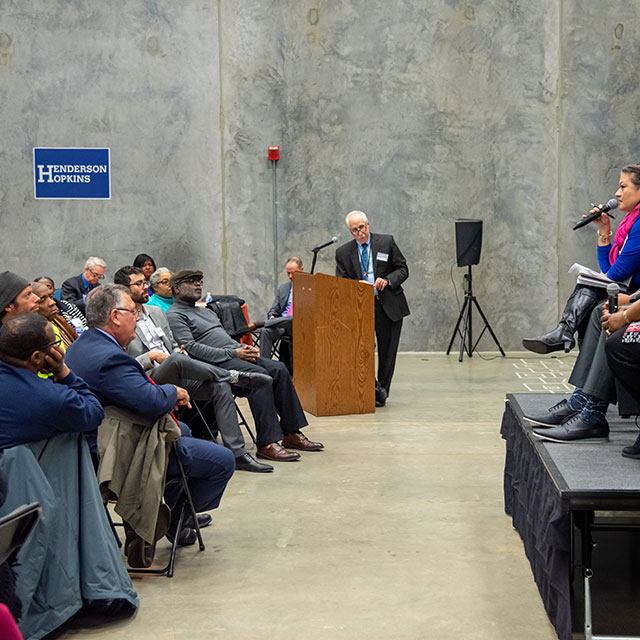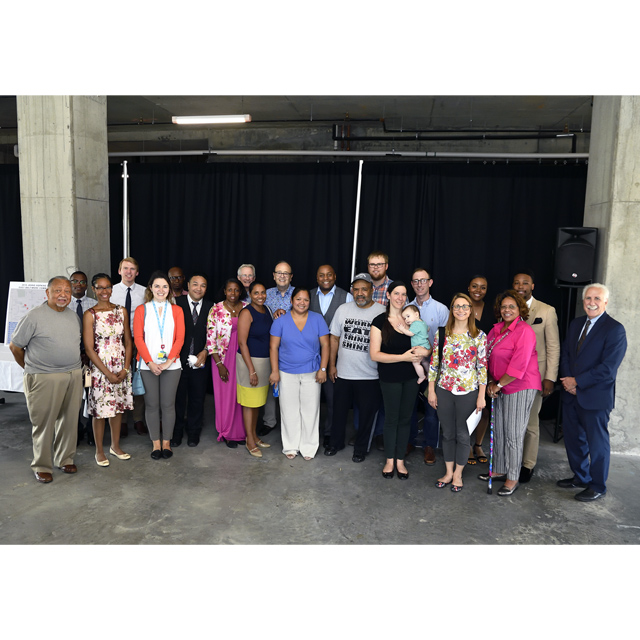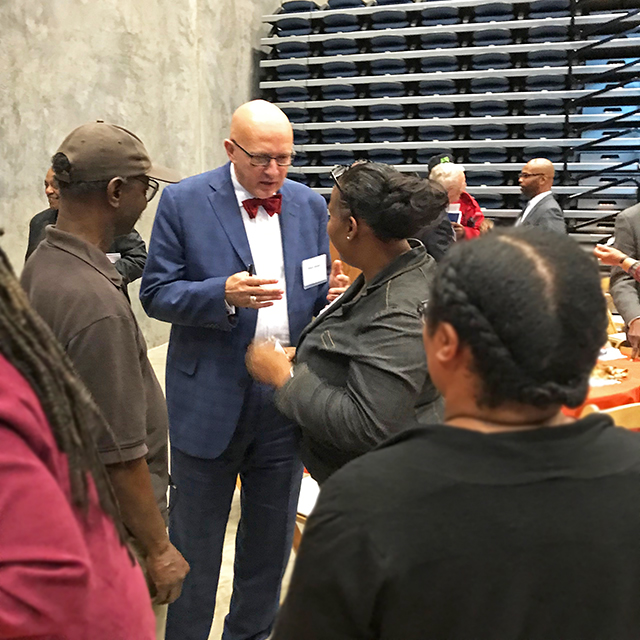More than 100 people attended the fifth East Baltimore Community Conversation on Thursday, Dec. 10. Due to the COVID-19 pandemic, the meeting was held on Zoom for the first time. The annual Community Conversations help foster open dialogue between Johns Hopkins Medicine and its neighbors.
The Community Conversation was hosted by Paul B. Rothman, M.D., dean of the medical faculty for the Johns Hopkins University School of Medicine and chief executive officer of Johns Hopkins Medicine. This year’s meeting featured a panel discussion with Sherita Golden, M.D., M.H.S., vice president and chief diversity officer for Johns Hopkins Medicine; Panagis Galiatsatos, M.D., M.H.S., pulmonary and critical care medicine physician; and Michael Preston, director of East Baltimore community affairs for The Johns Hopkins University and Johns Hopkins Medicine.
“2020 has been a year like no other,” Preston said in his opening remarks. “Everyone’s daily life has changed — from the way we interact with our family and friends, when we leave the safety and comfort of our homes to the way we do our jobs every day. Despite all the changes and uncertainty presented by a global pandemic, we have pulled together as an institution, as a community, as a city and as a state to serve one another and, in particular, those who are most vulnerable.”
Preston shared a slide show illustrating the work community leaders, The Johns Hopkins University and Johns Hopkins Medicine have performed to benefit Baltimore, particularly underserved city residents. He then introduced Tom Lewis, vice president of government and community affairs for The Johns Hopkins University and Johns Hopkins Medicine.
“These meetings give us direction, help, advice and thoughts from the community, and they’ve been really helpful,” Lewis said before introducing Rothman.
Rothman focused on COVID-19, but he also addressed a recent announcement by the Hopkins Retrospective, a system wide initiative to reexamine the institution’s history. The initiative discovered government census records indicating that Johns Hopkins, founder of The Johns Hopkins University and The Johns Hopkins Hospital, was the owner of enslaved people in 1840 and 1850, and perhaps earlier.
“That Mr. Hopkins owned slaves is a difficult revelation for us. We know it is also difficult for our community,” Rothman said. “I want to underline our continuing commitment now and moving forward to be transparent about what we learn. I also want to emphasize our institution’s commitment to fighting racial injustice and inequity in many forms, both in the city and in our institution itself. We know there’s a lot of hard work to be done and we’re prepared to do it.”
Rothman then turned to COVID-19, saying that the United States is in the middle of a major surge. He noted that in Baltimore City, the number of cases per day had doubled in the previous month. He then reiterated some of the ways people can reduce their risk, including:
· Wear a mask over the nose and mouth, especially when around people indoors.
· Keep 6 feet of physical distance from others.
· Wash hands.
· If feeling sick, stay home and get a coronavirus test.
Rothman emphasized the importance of testing, and noted that Johns Hopkins Medicine now has the capacity to test more than 2,500 people per day.
“We recommend everyone who has headaches, fevers, sore throats, fatigue, muscle aches, runny nose, stuffy nose, or stops being able to smell or taste, get tested,” he said.
Rothman also provided an update on the status of COVID-19 vaccines. In late December, Johns Hopkins Medicine began vaccinating health care workers, a process that will likely take months.
Rothman then opened a discussion with Golden, Galiatsatos and Preston. They touched on a range of topics including health equity, the social determinants of health and Johns Hopkins’ COVID-19 response.
“Two or three weeks after the pandemic started, it became very clear that people of color — African Americans, Latinos and Native Americans — were more affected,” Golden said. “It was thought to be related to the fact that those communities have more diabetes, cardiovascular disease, hypertension and obesity, all of which were recognized to be risk factors for having poor outcomes once infected with COVID-19.”
Golden said several factors contribute to deficient health outcomes. Communities’ historical experiences combined with a shortage of physicians of color have contributed to mistrust of the health care system. A lack of economic investment in those communities also results in a dearth of stable housing and access to healthy food. In addition, said Golden, people of color are more likely to have jobs that are considered essential, putting them at greater risk of exposure.
Rothman cited surveys showing that many Black Americans are reluctant to be vaccinated. Golden said Johns Hopkins is working to recruit, retain, mentor and advance diverse staff as well as examine hospital policies for evidence of structural racism.
Galiatsatos agreed. He said that knowing the community is as important as knowing the patient and the science. Throughout the pandemic, he has worked to connect with East Baltimore’s neighborhood and religious leaders on weekly conference calls that are open to everyone.
“These calls enable us to disseminate proper information about the pandemic and also hear back from the community about what’s going on,” Galiatsatos explained.
He said community members on the calls often remind him of the past.
“While we’re trying to write a new chapter, community members remember the prior ones and their memories are very vivid,” he says. “It’s up to us to be accountable and provide them with a trustworthy future. We need to stay transparent and keep everyone well-informed.”
The Johns Hopkins Office of Government and Community Affairs is also working to build trust in the communities that the hospital serves.
“When the pandemic hit, schools closed and businesses were shuttered. Many families lost consistent access to food,” Preston said. “Since April, we’ve been able to distribute more than 4 million meals to the East Baltimore community thanks to our community partners.”
Preston said Johns Hopkins has also distributed 85,000 masks and awarded $51,000 to neighborhood groups since the pandemic’s early days.
“We were able to meet specific needs, like protective equipment, so that community organizations were able to continue seeing their clients or provide services remotely,” Preston said.
Near the end of the discussion, Rothman invited questions from the audience. Most of the questions were about COVID-19 and the relationship between Johns Hopkins and the community. Golden and Galiatsatos stressed the importance of transparency.
“It’s important to just be very honest about what we do and don’t know,” Golden said.
Rothman closed the event on a hopeful note about the pandemic.
“We see the light at the end of the tunnel,” he said. “Hopkins is here to serve our community. We’re very committed to ensuring that everyone gets the best care they can. We’re going to help as best we can to get the vaccine to everyone in an equitable way.”



